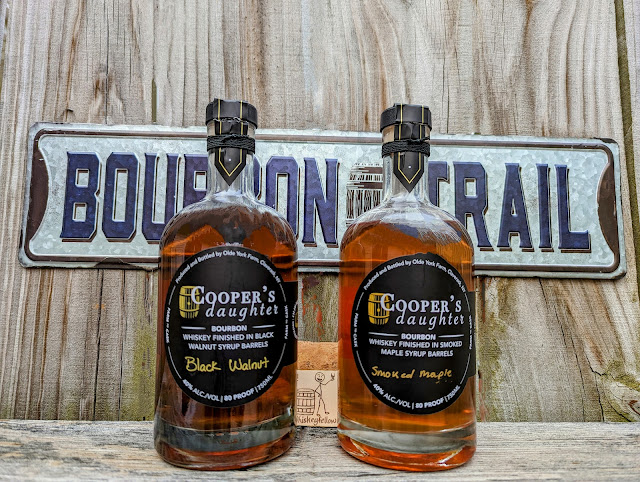The
backstory begins with J. Resselaer’s
Distillery & Cooperage, founded in 1805 just
outside of Hudson, New York. Jacob Rutsen van Rensselaer, the man behind the business,
owned and operated a mill along Claverack Creek and became the Secretary of
State of New York. Fast-forward to Prohibition, the police destroyed all the
stills in the area, leaving the Hudson Valley without a working distillery for
many decades.
This historic parcel of land, called Olde
York Farm, was purchased by Sophie, Stuart, and Louise
Newsome, and Rory Tice. Stuart was in the construction business for
over forty years. He renovated the ancient carriage house and turned that into a
distillery. Stuart is also the cooper; he really builds the barrels! His daughter,
Sophie, was a huge proponent of the farm-to-table movement and has a talent for
creating blends of ingredients that she thinks will be interesting. It made her
a natural choice for the position of Flavor Developer. Sophie’s husband, Rory, is
the head distiller and operations manager. And Sophie’s mother (and Stuart’s
wife), Louise, a marketing guru, uses her expertise for that and networking
with the suppliers that help make everything fall into place. The family named
their distillery Cooper’s Daughter Spirits, owned by Sophie and Louise,
and began operations in 2017.
The distillery offers three whiskeys along
with several vodkas and liqueurs. Rory provided me with two of their Bourbons: Smoked
Maple and Black Walnut.
“Our Bourbon is cask finished with organic maple syrup from Maple Leaf Sugaring in Ghent, NY, which has been smoked with American white oak. This is a slightly sweeter bourbon with round, smooth flavors and a light hint of smoke. It makes for the perfect snow day companion, snuggled under the covers, and sitting in front of a wood burning stove.” – Cooper’s Daughter Spirits
The mashbill of this Bourbon
hasn’t been disclosed, and it carries no age statement, which means it was aged
at least four years. There’s also nothing mentioned regarding char levels, but
we know it has all been done in-house. It is available year-round (whereas the
Black Walnut is a seasonal release) and packaged at 40% ABV (80°) in two sizes:
a 375ml for $37.00 or a 750ml for $63.00.
Rory included a recipe card
for what the brand calls a Sugar Shack Old Fashioned.
Appearance: I
sipped this Bourbon neat from my Glencairn glass. Inside, it was a light,
almost cloudy amber. A wide rim released sticky tears that fell back into the
pool.
Nose: The
first thing I smelled was smoke. I would have suggested this was a peated
whiskey if I didn't know better. The smoke was bold but not overbearing. I could
identify the aroma of maple syrup and an earthy quality. Light smoke danced
across my tongue when I drew that air into my mouth.
Palate: A soft
texture welcomed me to this tasting journey. Up at the front were corn and maple
syrup, while the middle featured a smoky vanilla flavor. As it arrived at the
back of my palate, I tasted caramel and dry oak.
Finish: Medium
in duration; the finish left me with maple syrup, dry oak, and smoky vanilla.
Bottle, Bar, or Bust: I wish
this Bourbon was at a higher proof. Perhaps the finishing barrels imparted too much
smoke, requiring it to be proofed down as much as it is? I found it challenging
to taste the actual Bourbon. The Smoked Maple Bourbon would likely make for a
great mixer because it is so bold. I’ll definitely try the Sugar Shack Old Fashioned.
Yet, I don’t buy whiskeys
for their cocktail potential. This finished Bourbon is also expensive, especially
considering its current proof. Knock it up six-to-ten points, and I would have
a different opinion.
Smoked Maple Bourbon is a fun
experience, but I believe its proper rating is a Bar.
Next up is the Black Walnut.
Like the Smoked Maple, The mashbill of the Black Walnut Bourbon hasn’t been disclosed, and it carries no age statement. It was aged in new, charred American oak barrels before being transferred to the black walnut syrup barrels. The Black Walnut Finish is a seasonal release packaged at 40% ABV (80°) in two sizes: a 375ml for $43.00 or a 750ml for $69.00.
Appearance: A neat pour into my Glencairn glass revealed a tawny-brown liquid that produced a medium-width rim. The rim held together for a few seconds before collapsing with watery tears.
Nose: Soft oak, walnut, caramel, and corn created a simple but enticing aroma. Nut butter rolled through my mouth as I pulled the vapor through my lips.
Palate: The texture was buttery. The palate was corn-forward, tamed by vanilla and honey. Midway through, I tasted walnut, while the back featured maple syrup, soft oak, and spicy rye.
Finish: Walnut carried through and was joined by honey, leather, rye, and oak tannin and remained for a medium duration.
Bottle, Bar, or Bust: There was more oomph to this whiskey’s finish than I would have guessed from the published proof, especially compared to its sister whiskey, Smoked Maple Bourbon. While I suggested it needed less dilution, Black Walnut is perfectly proofed. I was able to pull flavors easily. It is lovely when sipped neat; it could be tasty over ice as suggested or make a good cocktail base. In fact, I was provided with their Black Walnut Manhattan recipe:
Is Black Walnut a bit pricy? Yeah. But I’d opt for the 375ml option. It is different from any other barrel finishing that I’ve encountered before. My Bottle rating is well-deserved. Cheers!
My Simple, Easy-to-Understand Rating System
- Bottle = Buy It
- Bar = Try It
- Bust = Leave It
Whiskeyfellow encourages you to enjoy your whiskey as you see fit but begs you do so responsibly.





Comments
Post a Comment
As we should drink in moderation, all comments are subject to it. Cheers!